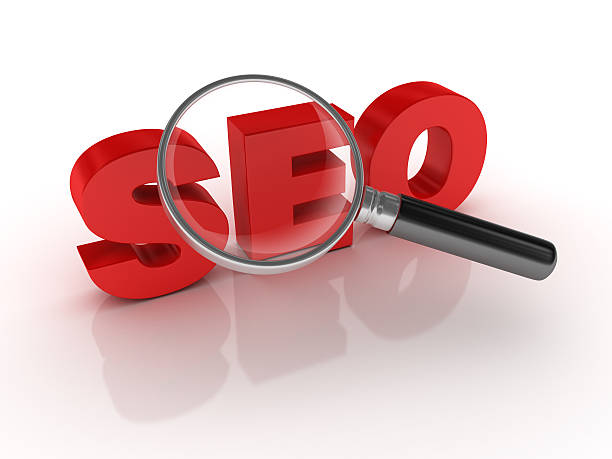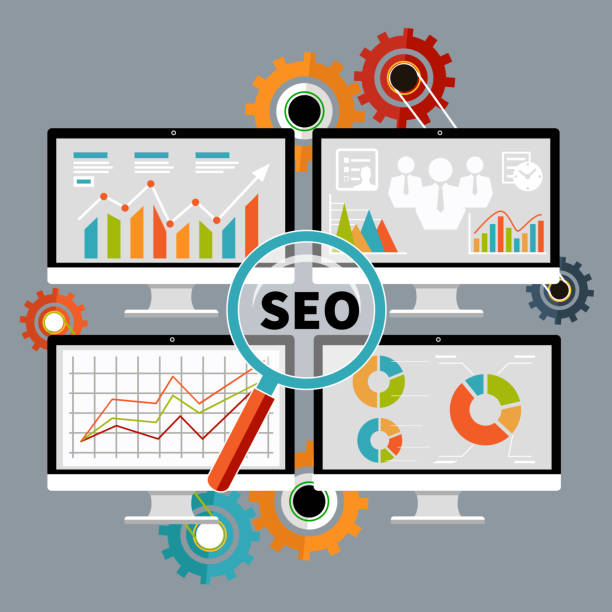Introduction to SEO and its Importance in the Online World
Why is SEO Essential for Online Success?
In today’s world, where online presence is of utmost importance for businesses and individuals, #SEO (Search Engine Optimization) plays a key role.
SEO refers to a set of techniques and strategies used to improve a website’s ranking in search engine results such as Google, Bing, and Yahoo.
By optimizing your website, you can attract more organic (non-paid) traffic and reach your target audience.
Simply put, SEO helps you when someone searches on Google for a product or service you offer, your website appears on the first pages of search results.
The importance of SEO stems from the fact that most internet users use search engines to find the information, products, or services they need.
If your website is on the lower pages of search results, the likelihood of users seeing it is greatly reduced.
As a result, you will miss out on many opportunities to attract customers, increase sales, and promote your brand.
Therefore, investing in SEO is a long-term and necessary investment for any business that wants to succeed in the online world.
Are you dissatisfied with the low conversion rate of visitors to customers on your online store?
Solve this problem forever with a professional online store design by Rasaweb!
✅ Increase visitor-to-customer conversion rate
✅ Create an excellent user experience and build customer trust
⚡ Get free consultation
Basic SEO Concepts Every Webmaster Should Know
Understanding Key SEO Terms
To get started with SEO, you need to familiarize yourself with its basic concepts and terms.
Some of the most important of these concepts include:
- Keywords Words or phrases that users use to search for information in search engines.
Choosing the right keywords is one of the most important steps in SEO. - On-Page SEO Refers to actions taken within a website to improve its ranking in search results.
These actions include content optimization, keyword usage, site structure improvement, and page loading speed. - Off-Page SEO Refers to actions taken outside of a website to increase its credibility and ranking in search results.
These actions include backlinking, social media marketing, and branding. - Backlinking Refers to the process of receiving links from other websites to your website.
Links are one of the most important ranking factors in Google. - Bounce Rate Refers to the percentage of users who leave a website page after viewing it, without visiting other pages.
A high bounce rate indicates that the page content is not appealing to users. - User Experience (UX) Refers to the feeling and experience that users have when using your website.
A good user experience increases user satisfaction and improves the site’s ranking in search results.
Understanding these basic concepts helps you to develop and implement your SEO strategy more effectively.
Keyword Research – The Key to Success in Content SEO
How to Find the Right Keywords?
Keyword research is one of the most important steps in SEO.
Using various tools, you can find words that users use to search for information related to your business.
These keywords should be relevant, popular, and have low competition.
There are various tools for keyword research, including Ahrefs, Moz, SEMrush, and Google Keyword Planner.
These tools help you find keyword search volume, competition level, and related keywords.
You can also use Google Trends to check the popularity trend of keywords over time.
After finding the right keywords, you should use them naturally and purposefully in your website content.
Use keywords in titles, meta descriptions, main text, and alt text for images.
But be careful to avoid overusing keywords, as this can lead to your website being penalized by Google.
The table below shows an example of keywords and statistics related to SEO.
| Keyword | Monthly Search Volume | Competition Level |
|---|---|---|
| SEO Training | 5000 | Medium |
| What is SEO | 3000 | Low |
| Site Optimization | 4000 | Medium |
On-Page SEO – Optimizing Web Pages
Optimizing Various Page Elements for SEO
On-page SEO involves optimizing various elements of a website page for search engines.
These elements include:
- Title Tag The page title is the most important on-page SEO element and should include the page’s main keyword.
The page title should be short, catchy, and descriptive. - Meta Description The meta description is a summary of the page’s content that appears in search results.
The meta description should be compelling and persuasive to encourage users to click. - Heading Tags (H1, H2, H3, …) Headings define the structure of the page content and help search engines understand the main topic of the page.
Use keywords in headings, but avoid overuse. - Content The page’s content is the most important ranking factor in Google.
The page’s content should be high-quality, valuable, unique, and relevant to the keywords.
The page’s content should be updated regularly. - Images Images should be described with Alt Text.
Alt text helps search engines understand the content of the images.
Use keywords in the alt text of images. - URL Page addresses should be short, readable, and include keywords.
Use hyphens (-) to separate words in the URL.
Click here to preview your posts with PRO themes ››
By optimizing these elements, you can improve your website’s ranking in search results.
Are you disappointed with the low conversion rate of your online store?
Rasaweb, with its professional online store design, is your definitive solution!
✅ Increase your sales and revenue
✅ Unparalleled user experience for your customers
⚡ Get a free consultation right now!
Off-Page SEO – Increasing Website Credibility
The Role of Link Building in Off-Page SEO
Off-page SEO involves actions taken outside of a website to increase its credibility and ranking in search results.
The most important off-page SEO strategy is link building.
Link building is the process of receiving links from other websites to your website.
Links are like votes cast for your website and show Google that your website is credible and valuable.
For link building, you can use various methods, including:
- Creating high-quality and valuable content If your content is high-quality and valuable, other websites will link to it.
- Participating in forums and social networks By participating in forums and social networks, you can create links to your website.
- Submitting articles to other websites You can submit articles to other websites and include links to your website in these articles.
- Exchanging links with related websites You can exchange links with related websites.
- Buying links Buying links is a risky method and may result in your website being penalized by Google.
Incoming links should be from credible, relevant, and high-quality websites.
Receiving links from low-quality and irrelevant websites can harm your website.
Optimizing User Experience (UX) and its Impact on SEO
Why is Good User Experience Important for SEO?
User Experience (UX) refers to the feeling and experience that users have when using your website.
A good user experience increases user satisfaction, reduces bounce rate, increases time spent on the site, and ultimately improves the site’s ranking in search results.
Google places great importance on user experience and ranks websites that provide a good user experience higher.
To improve the user experience of your website, you can use the following solutions:
- Improving page loading speed Page loading speed is one of the most important factors in user experience.
Users are unwilling to wait for pages to load. - Responsive Design Your website should be optimized for different devices (mobile, tablet, desktop).
- Using a simple and user-friendly design The website design should be simple, user-friendly, and attractive.
- Improving site navigation Site navigation should be easy and clear so that users can easily find the information they need.
- Using high-quality and readable content The website content should be high-quality, valuable, readable, and attractive.
- Improving Accessibility Your website should be accessible to all users, including people with disabilities.
By improving the user experience of your website, you can improve your site’s ranking in search results and attract more organic traffic.
Technical SEO – Optimized Technical Infrastructure for Search Engines
Reviewing Important Technical Elements in SEO
Technical SEO refers to optimizing the technical infrastructure of a website for search engines.
Technical SEO includes actions such as:
- Creating a Sitemap A sitemap is a list of all the pages on a website that helps search engines easily find and index the site’s pages.
- Creating a Robots.txt file The Robots.txt file tells search engines which pages of the site should not be indexed.
- Optimizing page loading speed Page loading speed is one of the most important factors in technical SEO.
- Fixing 404 errors 404 errors are pages that do not exist.
Fixing these errors helps improve user experience and site SEO. - Using HTTPS HTTPS is a security protocol that encrypts communication between the browser and the website.
Google gives more importance to websites that use HTTPS. - Optimizing for mobile Your website should be optimized for mobile devices.
Click here to preview your posts with PRO themes ››
The table below shows an example of common technical SEO errors and their solutions.
| Error Type | Description | Solution |
|---|---|---|
| 404 Error | Page Not Found | Redirect to a related page or create a new page |
| Duplicate Content | Content is repeated on several pages | Use Canonical Tag or merge pages |
| Slow Loading Speed | Pages load slowly | Optimize images, use CDN, and optimize code |
Content is King – SEO-Oriented Content Production Strategy
How to Produce Attractive and SEO-Optimized Content?
Content is the most important ranking factor in Google.
Your content should be high-quality, valuable, unique, and relevant to the keywords.
Your content should be updated regularly.
To produce SEO-oriented content, you can use the following solutions:
- Keyword Research Before producing content, research keywords related to your topic.
- Content Planning Have a content plan and specify what type of content you will produce and when.
- Producing high-quality and valuable content Your content should be high-quality, valuable, unique, and relevant to the keywords.
- Optimizing content for SEO Use keywords in titles, meta descriptions, main text, and alt text for images.
- Advertising content Advertise your content on social networks, forums, and other websites.
There are different types of content you can produce, including articles, blog posts, videos, infographics, podcasts, etc.
Choosing the type of content depends on your target audience and the content topic.
Try to produce content that is attractive and valuable to your audience.
Does your current company website not reflect the credibility and brand power you should have? Rasaweb solves this challenge for you with professional company website design.
✅ Increase the credibility and trust of visitors
✅ Attract more targeted customers
⚡ Click to get a free consultation!
SEO Tools – Introducing and Using the Best Tools
Introducing the Best SEO Tools
SEO tools help you optimize your website, improve its ranking in search results, and attract more organic traffic.
There are different SEO tools, each with its own features and capabilities.
Some of the best SEO tools include:
- Ahrefs is one of the most powerful SEO tools that helps you check your website’s incoming and outgoing links, find your competitors’ keywords, and track your keywords’ ranking in search results.
- Moz is another popular SEO tool that helps you optimize your website, perform link building, and track your keywords’ ranking in search results.
- SEMrush is a comprehensive SEO tool that helps you perform keyword research, analyze your competitors, optimize your website, and manage your advertising.
- Google Keyword Planner is a free tool provided by Google that helps you find keywords related to your business and check their search volume.
- Google Search Console is a free tool provided by Google that helps you check your website’s performance in search results, find site errors, and submit your sitemap.
Choosing the right SEO tool depends on your needs and budget.
Before buying any tool, check whether it offers the features and capabilities you need.
Measuring and Analyzing SEO Results – How to Know SEO is Working?
Important Metrics for Measuring SEO Success
Measuring and analyzing SEO results helps you understand whether your SEO strategy is effective or not.
To measure SEO results, you can use various metrics, including:
- Organic Traffic Organic traffic is traffic that comes to your website from search engines.
Increased organic traffic indicates that your SEO strategy is effective. - Keyword Ranking Keyword ranking shows where your website ranks in search results for the desired keywords.
Improving keyword ranking indicates that your SEO strategy is effective. - Bounce Rate Bounce rate refers to the percentage of users who leave a website page after viewing it, without visiting other pages.
Reducing bounce rate indicates that your website content is appealing to users. - Time Spent on Site Time spent on site refers to the amount of time users spend on your website.
Increasing time spent on site indicates that your website content is valuable to users. - Conversion Rate Conversion rate refers to the percentage of users who take a desired action, such as buying a product, signing up for a newsletter, or contacting you.
Increasing conversion rate indicates that your website is attractive and persuasive to users.
Click here to preview your posts with PRO themes ››
To measure and analyze SEO results, you can use various tools, including Google Analytics and Google Search Console.
By analyzing this data, you can identify the strengths and weaknesses of your SEO strategy and make the necessary changes.
Frequently Asked Questions
| Question | Answer |
|---|---|
| What is SEO? | SEO or Search Engine Optimization is a process to increase the quality and quantity of website traffic by improving the site’s ranking in the natural (organic) results of search engines such as Google. |
| What are the main types of SEO? | SEO is divided into three main categories: On-Page SEO, Off-Page SEO, and Technical SEO. |
| What does On-Page SEO include? | On-page SEO includes optimizing elements within the website, such as keywords, page title (Title Tag), meta description, content, URL structure, images, and internal links. |
| What is Off-Page SEO? | Off-page SEO refers to activities outside of the website that help improve its ranking, such as backlink building, social media marketing, and brand mentions. |
| What is Technical SEO? | Technical SEO optimizes the technical aspects of the website to help search engines crawl and index it better. This includes site speed, mobile-friendliness, site structure, sitemaps, and the Robots.txt file. |
| What role do keywords play in SEO? | Keywords are phrases that users enter into search engines. Using relevant keywords correctly and purposefully in the content and site elements helps search engines understand the topic of your page and display it in related searches. |
| What is a backlink and why is it important? | A backlink or incoming link is a link from one website to another. Backlinks act as a “vote of confidence” from other sites for search engines and play an important role in the credibility and ranking of the site, especially if they are from reputable sites. |
| What effect does high-quality content have on SEO? | High-quality, relevant, comprehensive, and unique content not only attracts and retains users, but also shows search engines that your page is valuable. This helps improve ranking, reduce bounce rate, and increase the user’s time on the site. |
| Why is site loading speed important for SEO? | Site loading speed is an important ranking factor for Google. Faster sites provide a better user experience, have lower bounce rates, and are preferred by search engines. |
| Is SEO a one-time process? | No, SEO is an ongoing and long-term process. Search engine algorithms are constantly changing, competition is increasing, and site content also needs to be updated. Therefore, SEO requires continuous monitoring, analysis, and optimization. |
And other advertising services of Rasa Web Advertising Agency
Smart Data Analysis: A dedicated service for growing customer acquisition based on attractive user interface design.
Smart Data Analysis: Designed for businesses looking to improve SEO ranking through marketing automation.
Smart Customer Journey Map: Transform digital branding with Google Ads management.
Smart Brand Identity: Designed for businesses looking to improve SEO ranking through precise audience targeting.
Smart Data Analysis: Transform click-through rates with custom programming.
And more than hundreds of other services in the field of internet advertising, advertising consulting, and organizational solutions
Internet Advertising | Advertising Strategy | Advertorials
Resources
What is Content SEO? The Definitive Guide to Content SEO in 2024
,Content SEO: An Actionable Guide to Ranking in Google
,How to Optimize Your Content for SEO: A Complete Guide
,Content Marketing for SEO: How to Create Content That Ranks
? In today’s competitive world, a powerful online presence is the key to success. Rasaweb Afarin Digital Marketing Agency takes your business to the peak by offering comprehensive services including fast website design, SEO, and social media management. Contact us today for a free consultation and to learn more about our services. 021-91097325
📍 Tehran, Mirdamad Street, next to the Central Bank, Southern Kazerun Alley, Ramin Alley No. 6















